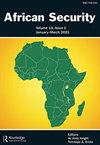Policing the Seas: Building Constabulary Maritime Governance in the Horn of Africa – The Case of Djibouti and Kenya
IF 1.3
Q2 POLITICAL SCIENCE
引用次数: 5
Abstract
ABSTRACT The upsurge of Somali based maritime piracy after 2005 resulted in considerable international activity in the Horn of Africa, ranging from naval missions to capacity building projects. It also ushered in a new focus by regional states on the dangers as well as the opportunities associated with the sea. In Kenya and Djibouti, two states directly impacted by piracy, this resulted in a strategic shift toward the ocean, breaking with a historical land-centric security approach, in an attempt to reform their domestic maritime sectors and coastal governance architectures by capitalizing on assistance from external capacity building providers. This article adds rigor to the field of maritime security studies by zooming in on how two key littoral states have reformed their domestic maritime sectors following a decline in acts of piracy. It explores important questions such as how have Djibouti and Kenya approached maritime governance historically? How are their territorial maritime spaces delineated and defined? How has the phenomena of piracy influenced the development of coastal governance in both countries? Has this led to innovative practices? Can these practices be applied in other jurisdictions? Finally, what has been the impact of external capacity building assistance on the development of both Djibouti and Kenya’s maritime sector and respective approaches to coastal governance and enforcement? This research is significant as it sheds new light on the limitations and challenges facing domestic maritime security sectors in Africa, but also highlights new ways states can improve and build maritime constabulary governance through international partnerships, capacity development and embracing the blue economic agenda using the cases of Djibouti and Kenya as archetypal models.海洋治安:非洲之角建立海上警察治理——以吉布提和肯尼亚为例
2005年之后,索马里海盗活动的激增导致了在非洲之角的大量国际活动,从海军任务到能力建设项目。它还使区域各国重新关注与海洋有关的危险和机遇。在肯尼亚和吉布提这两个直接受到海盗影响的国家,这导致了向海洋的战略转变,打破了历史上以陆地为中心的安全方法,试图通过利用外部能力建设提供者的援助来改革其国内海事部门和沿海治理架构。本文通过聚焦两个主要沿海国家在海盗行为减少后如何改革其国内海事部门,为海事安全研究领域增加了严谨性。它探讨了一些重要的问题,如吉布提和肯尼亚在历史上是如何处理海洋治理的?两国的领海是如何划定的?海盗现象对两国沿海治理的发展有何影响?这是否导致了创新实践?这些做法可否适用于其他司法管辖区?最后,外部能力建设援助对吉布提和肯尼亚海事部门的发展以及各自的沿海治理和执法方法产生了什么影响?这项研究意义重大,因为它揭示了非洲国内海上安全部门面临的局限性和挑战,但也强调了各国可以通过国际伙伴关系、能力发展和采用蓝色经济议程来改善和建立海上警察治理的新途径,并以吉布提和肯尼亚的案例为原型模型。
本文章由计算机程序翻译,如有差异,请以英文原文为准。
求助全文
约1分钟内获得全文
求助全文

 求助内容:
求助内容: 应助结果提醒方式:
应助结果提醒方式:


